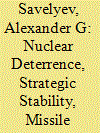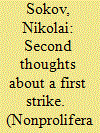| Srl | Item |
| 1 |
ID:
192491


|
|
|
|
|
| Summary/Abstract |
The article addresses a set of problems pertaining to nuclear deterrence,
strategic stability, and missile defense. The author states that as a derivative
of nuclear deterrence strategic stability can only be applied to military-
strategic relations between Russia and the United States. This concept
“does not work” in all other cases, including the multilateral format of
relations. Nuclear deterrence is more universal and impacts, among other
things, the decision-making process in relatively strong and weak nuclear
states that oppose each other. The effectiveness of nuclear deterrence is
not determined solely by the balance of opposing forces. No less important
is the assessment by a potential aggressor of all the negative consequences
of its decision to strike first, which creates the “self-deterrence” effect that
outweighs even the aggressor’s absolute confidence in the complete military
success of its nuclear attack.
|
|
|
|
|
|
|
|
|
|
|
|
|
|
|
|
| 2 |
ID:
076776


|
|
|
|
|
| Publication |
2007.
|
| Summary/Abstract |
This article critiques recent articles in Foreign Affairs and International Security that argue that in the foreseeable future the United States could acquire an assured first-strike capability vis-à-vis Russia and China thanks to technological improvements in U.S. nuclear delivery systems and a general decline in the numbers and capabilities of Russian nuclear forces. Notwithstanding these articles, this analysis finds that mutual deterrence will persist regardless of the scale of possible future imbalances because deterrence is a highly flexible phenomenon. The pertinent question is not whether the United States will be able, in a surprise first strike, to cripple severely Russian response capabilities, but whether political stakes in any foreseeable conflict could justify the risk of even a small retaliatory strike on the United States. This article also assesses whether the Foreign Affairs and International Security articles could inadvertently exacerbate an already highly charged anti-American sentiment in Russia, possibly laying the foundation for a revitalization and expansion of the Russian nuclear arsenal.
|
|
|
|
|
|
|
|
|
|
|
|
|
|
|
|